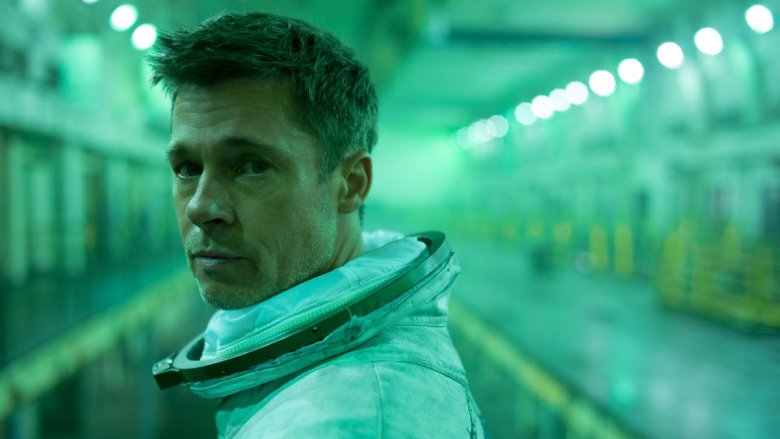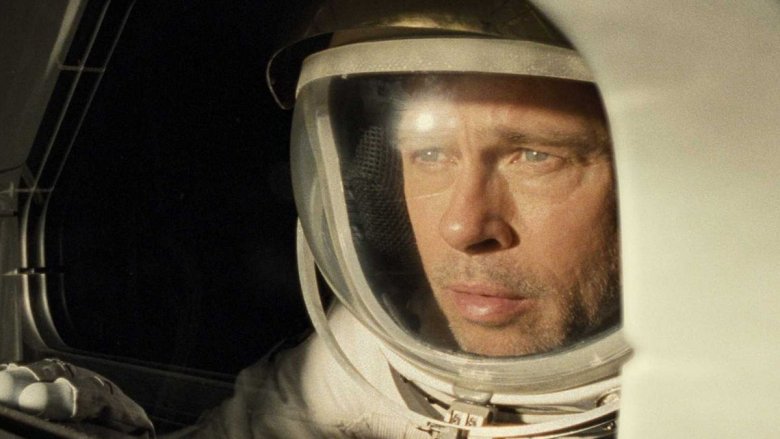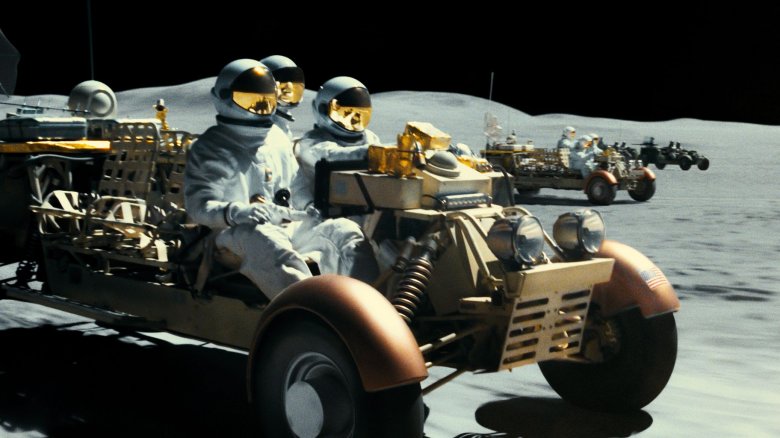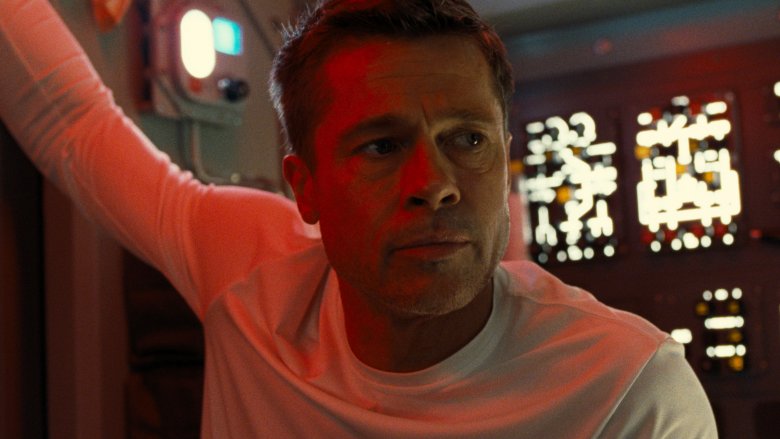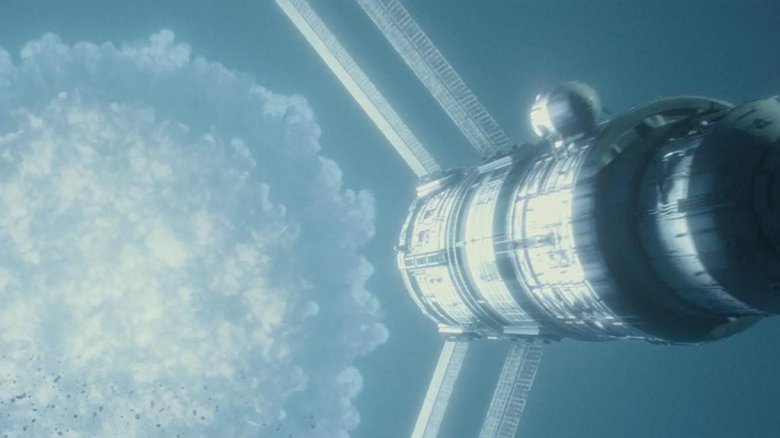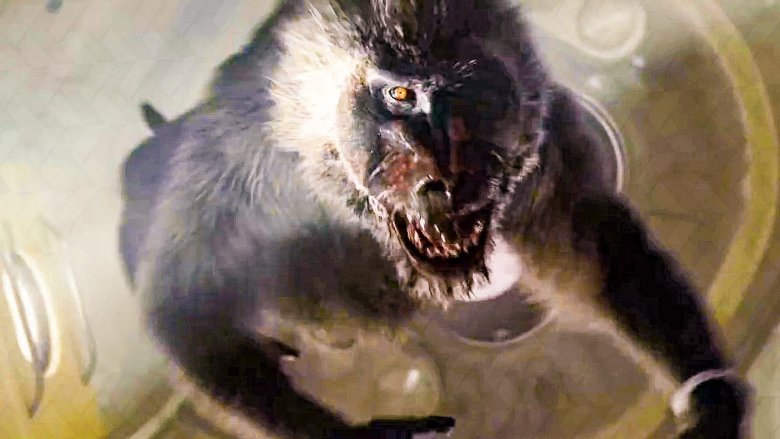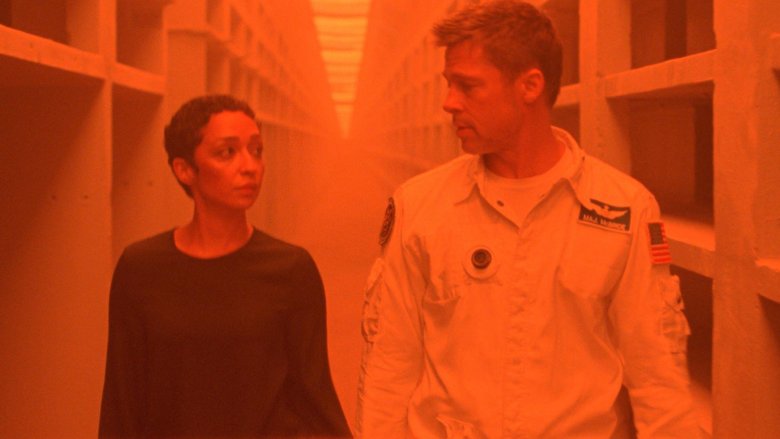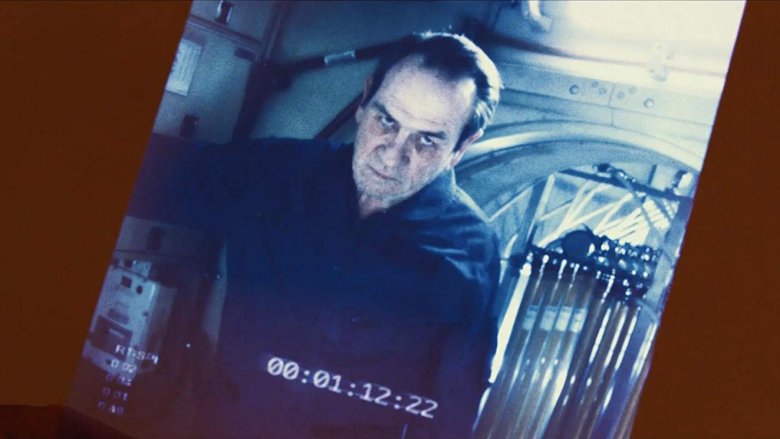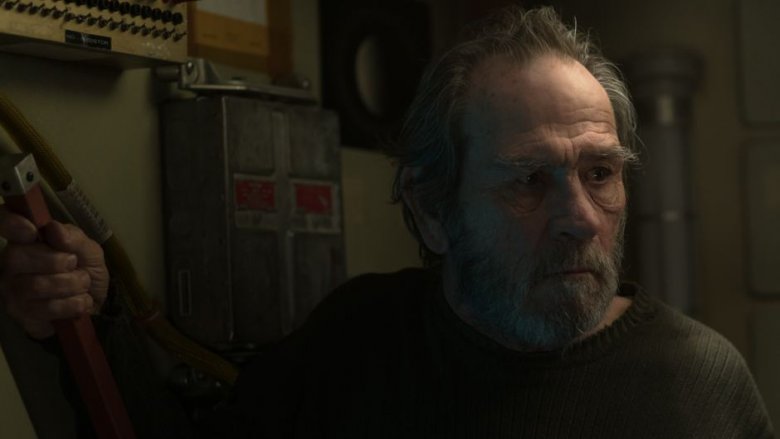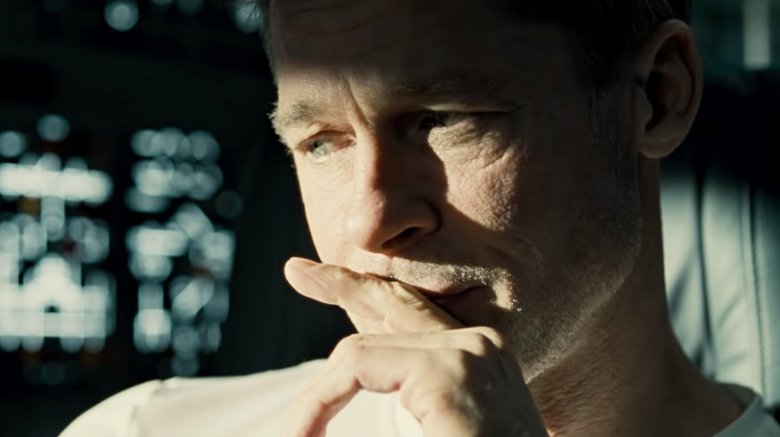The Ending Of Ad Astra Explained
Ad Astra is a space epic that's as much about the inner journey as it is about a space exploration. Set in the near future, the story opens with Major Roy McBride (Brad Pitt) barely surviving a power surge on a massive space antennae. We soon learn the cause of the surge was an antimatter reaction from the edge of our solar system. US Space Command, or SpaceCom, believes the Lima Project — a decades-old exploration mission meant to locate intelligent alien life — is somehow responsible. Though they haven't heard from Lima in all that time and assumed the worst, they now believe its commander, Cliff McBride (Tommy Lee Jones), is alive and has lost his mind. They send Roy, Cliff's son, in hopes of contacting his father. The journey takes Roy to the moon, Mars, and eventually the rings of Neptune.
Ad Astra is a surreal odyssey, and there's a lot that's left unsaid as well as some mysteries that are never completely solved. Much of the film's drama goes on in the minds and souls of its characters, leaving us to guess and theorize as to many of their motivations. Keep reading for our best shot at explaining the ending of Ad Astra.
What leads up to Ad Astra's final act?
After SpaceCom determines that Clifford McBride is likely behind the destructive pulse that sets the events of the film in motion, Roy is dispatched to the moon, where he'll stop off before heading to Mars and attempting to establish communication with his father. Roy ultimately ends up journeying all the way to Neptune, where he discovers that SpaceCom was right — his father is still alive, and was at least partly responsible for the antimatter surge, which resulted after the crew of his station mutinied. The conflict ended with Clifford's crew dead, but they also irrevocably damaged the battery powering the station.
But the true tragedy, at least in Clifford's eyes, is the result of all that research, which shows no sign of intelligent alien life. Although the senior McBride compiled reams of data about outlying planets and systems during his time on Lima Project, he didn't find what he was really looking for. Clifford was so determined to fulfill his mission in this one particular way that he was willing to abandon his family — and even kill — for it. Although the information he ended up gathering is still invaluable, it can't help but feel like a hollow victory on multiple levels.
In space, no one can hear your betrayal
Roy McBride is uniquely qualified for his journey to determine the fate of Project Lima in a number of ways. The most obvious one, of course, is his family connection to the Project's long-lost leader — a connection that highlights the emotional dynamics explored throughout the story on a literal and subtextual level. Roy is also, however, an almost superhumanly reserved man; even working in dangerous conditions in deep space, his pulse goes no higher than 80bpm, and his regular psychological evaluations betray none of the increasingly unhinged responses that would be natural for pretty much anybody traveling to Neptune in order to find their presumed dead father.
It's this quality that comes in extra handy when Roy realizes what SpaceCom is really up to — specifically, the agency is out to double-cross him and kill Clifford. The secret plan all along is to observe Roy's attempt to establish communication with Clifford, using Clifford's response to figure out where he is and then travel there to finish him off with a nuclear bomb. Along the way, the members of the SpaceCom team attempt to get rid of Roy too — but when it's all over, he's the one left standing.
Is Ad Astra an anti-space-exploration movie?
The central message of Ad Astra is best summed up by Roy's words to his father just before they leave Project Lima. Roy tells his father that what Cliff has proven — that there's no alien life to be found — is just as important as finding another world full of intelligence. By learning there is no intelligent life in the known universe, Cliff has shown us that, as Roy puts it, "We're all we've got."
Speaking to Digital Spy, writer/director James Gray explained that the idea of looking for answers in alien life isn't a particularly appealing idea to him. "The idea that there's these little green men out there that'll either save us or eat us," Gray said, "to me that's more horrifying than having to rely on other people."
It might lead you to look at Ad Astra as an anti-space-exploration film, but that doesn't seem like that's the case. It's clear Gray took great pains to make the technology and science as authentic as possible, and the film highlights the importance of space travel in other ways. Roy goes out of his way to retrieve all the data from Project Lima, including scans of countless worlds, even leaving a message for SpaceCom urging them to retrieve his spacecraft in the event of his death so the data isn't lost. That seems like a strange priority for a film that doesn't value the quest to explore the cosmos.
An explosive reunion
With the Lima Project's antimatter battery damaged, the station is a lost cause — and one that's actively endangering life on other planets as it breaks down. Clifford can't repair it, but thankfully, Roy has arrived with a solution of sorts: the nuclear bomb SpaceCom intended to use to wipe out the station, Clifford and all. After getting his father out, Roy uses the bomb for part of its intended purpose, blowing up the station and getting rid of the battery in the bargain.
It's an ignominious end for Lima Project, and one that underlines the mission's progressively darker history. Setting out with hope before spiraling into madness, violence, and catastrophic loss of life, Lima reinforces the wisdom Roy imparts to his father after their reunion — demonstrating that we're ultimately all we have, and our most powerful solutions must come from within. While it's difficult to see Ad Astra as an indictment of exploration, it's just as hard to escape another component of its message — that running from problems we're meant to face where we are can only lead to disappointment, or worse.
What happened on Ad Astra's Norwegian space station
During the trip from the moon to Mars, Captain Tanner (Donnie Kashawarz) insists on answering an S.O.S. call from a Norwegian research station over Roy's objections. One of the station's test animals, an escaped baboon, kills Tanner and attacks Roy. McBride manages to escape with Tanner's body, and the crew continues on their journey to Mars.
Strangely, we never learn what happened to the crew of the station. In light of what happens to Tanner, you might assume they were killed by the baboon, but Roy never see any evidence of violence on the station besides Tanner's death. The next best conclusion is that the station was abandoned — but if so, then why didn't the crew turn off their S.O.S. message before leaving?
That the crew escaped seems the most likely answer. If they lost power from one of the antimatter surges, causing the ape and possibly other lab animals to escape, this could explain not only why they left but why they might not have had time to turn off the S.O.S. message. It makes sense thematically because of what Roy says after during his psych evaluation. He says he understood the ape's rage, and considering the sense of surreal isolation throughout the film and how it's in part this isolation that affects the mental health of certain characters, it's the best explanation for the ape's violence.
Why does Helen Lantos help Roy?
Mars administrator Helen Lantos (Ruth Negga) reveals top secret information to Roy, helping him stow away on the ship heading to Neptune. She tells Roy it's because she's in charge of over 1100 lives, but when we look at the situation through the lens of Ad Astra's central message, Helen's motivations seem more complex.
Helen was born on Mars and her parents were murdered by Cliff McBride. As soon as we meet Helen, she's very much aware of the message it takes Roy until the end of Ad Astra to learn — that "we're all we've got." It's likely she yearns for the connection to humanity she's never experienced.
Gray gives us a lot of visual cues with Helen. Roy meets her in a red hallway which turns black as she leads him to the end. Later, when she comes to the Comfort Room, the images on the walls shift to the oceans of Earth. Most interesting is a decoration in her quarters. As she speaks to Roy, we see a large empty bird cage next to her. It reflects the film's central message in a bit of a funny way. If you think of a man like Cliff who sees Earth as a prison and must be in space, Helen's empty cage is a reminder that the prison Cliff sees doesn't exist. After all, if a cage is empty, is it still a cage?
What happened to Cliff McBride after his disappearance?
Somewhere between Earth and Neptune, it seems pretty obvious that Cliff McBride lost his freaking mind. But one of the interesting things about Ad Astra is that with Roy's voyage, we get to turn the clock back and see exactly how his marbles spilled out.
Roy's narration tells us there are physical components affecting his mental health, like the extended time spent in zero gravity, particularly during the last leg of his trip to Neptune. More importantly there's the isolation of space, something Roy is forced to dive into deeper and deeper to continue his quest to find his father.
Roy's journey mirrors what must have been his father's in a lot of ways, including the death toll. When Roy reaches his father, we learn the antimatter surges aren't something Cliff has been causing on purpose. His struggles against his crew, he says, caused the damage that led to the antimatter instability causing the surges. This is something Roy is familiar with, because his trek through the stars has left behind a trail of collateral damage. With the exception of Helen Lantos and possible exception of Colonel Pruitt, just about everyone who has been at Roy's side throughout his journey is dead by the end of Ad Astra. Though he doesn't mean for it to happen, he indirectly causes the death of the surviving crew on the ship to Neptune, just as Cliff indirectly unleashes the antimatter surge that threatens the solar system.
Why does Cliff McBride choose to die?
After they escape Project Lima, Cliff detaches himself from Roy, meaning certain death for the old astronaut. He has more than a few reasons for doing it — though it's probably not his first choice. As Roy helps Cliff put on his space suit, we can see the father evaluating his son, and possibly wondering if he could somehow physically stop him. While he does express some admiration for Roy, he flatly tells him he doesn't love him and didn't even think about him for all the years he was on Project Lima — so if he could have stopped Roy, he probably would have.
When he chooses death, Cliff sees no real alternative. First, there are the consequences he might have to face upon returning to Earth. He doesn't know that his crimes have been swept under the rug, and so has no reason to think he'll be shown any mercy. Second, while he may refuse to admit it to himself, what he calls his destiny has proven to be a sham. Considering everything he's done — including murdering his colleagues — for that "destiny," how could he not want to end things? Third and finally, as he tells Roy, this lonely void has become his home. Ultimately, he has no desire to return to Earth.
What's Ad Astra trying to tell us?
Ad Astra has been compared to a number of space-based dramas that should be familiar to film fans, including Stanley Kubrick's classic 2001: A Space Odyssey, and its parent-child themes echo those explored in similarly extraterrestrial fare like First Man and Gravity. True to his word, writer-director James Gray serves up a quest for alien life and several helpings of space action, but that isn't really where his — or his movie's — heart lies: on a more fundamental level, Ad Astra is a movie about the fundamental desire for connection between parents and their offspring, and the places people can be driven to when that connection is lost.
In many ways, Roy McBride's journey is a terribly sad one — he's betrayed by his employers, he's faced with his father's insanity and emotional void, and he finally loses the parent he journeyed billions of miles to save. But in spite of all that loss, the movie's real message remains powerfully hopeful. As Roy tells Clifford, we're all we've got — and even if that doesn't always look or feel like what we need, it can still be enough to overpower duplicitous military brass, murderous space monkeys, and a legacy of violent madness. It can be a hard-fought lesson to learn, but fortunately, most of us don't need to fly to Neptune to get it.
